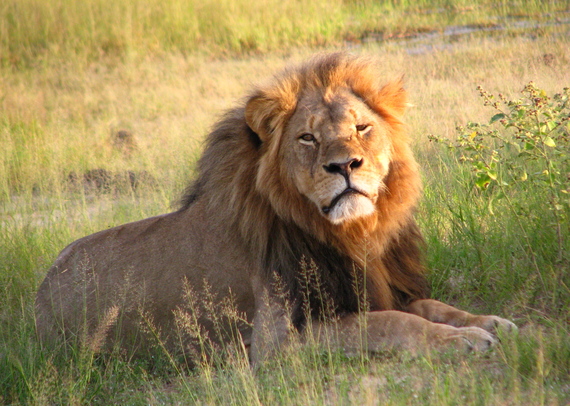On the first of July, 2015 a Minnesotan dentist shot a Zimbabwean lion, for sport. This leisurely activity involved the acquisition of a carcass, a bow and arrow, a hunting gun, and a $50,000 salaried Zimbabwean guide. A few weeks later and a little further south, an Idaho accountant posed over a dead South African giraffe... hen an impala, a kudu, a wildebeest, and a warthog.
To the outraged animal loving, tree-hugging, composting and recycling, yoga practicing vegetarians of the world, the huntress said: "...How can you fault somebody because of their hobbies?" The hunt is legal, and besides, the locals do it too. True. The Hwange National Park in Zimbabwe is plagued with poachers who, between 2003 and 2005 alone,
Nuance: Zimbabweans poach because at least 72.3 percent of them live below the poverty line. Starvation, fuel shortages, deforestation and mass soil erosion have made it difficult to survive otherwise. In a country whose $2,000 GDP per capita ranks it 203rd in the world, a $300,000 rhinoceros horn can go a long way. Especially when there is a market for it.
We live in a jungle of nuances. Between what is legal and what is not, what is moral and what is not. What we want and what we need, and what we think we need. The jungle is governed by interests. Animal and human, substantial and trivial. Our interest in survival is a substantial one, because we need to be alive to have any other interests at all. Our interest in entertainment and sport is a trivial one. We do not need hobbies to live; their added value is to the quality of our life.
Some would say there are more pressing
Others would say that Zimbabwe is a long way away. Giraffes and lions are dangerous, elephants are not endangered yet, and rhinoceros horns are rumored to be aphrodisiacs. By the very dictates of evolutionary theory and social Darwinism, the fittest must survive, and the weak be mounted over the fireplace.
According to the Oxford dictionary, the law of the jungle is "the principle that those who are strong and apply ruthless self-interest will be most successful." Our jungle is one of individualism and unrestrained competition, and we have come to accept it as such. Cecil the lion may have needed his head, but William the dentist wanted it. Too bad for the lion.
But the original "law of the jungle" meant something entirely different. The term was first coined by Rudyard Kipling in a poem he wrote to describe the natural obligations and behavior of wolves in a pack:
_Now this is the Law of the Jungle--as old and as true as the sky;And the Wolf that shall keep it may prosper, but the Wolf that shall break it must die. As the creeper that girdles the tree trunk, the law runneth forward and back;For the strength of the Pack is the Wolf, and the strength of the Wolf is the Pack.
Instead of ruthless competition, the law called for social cooperation; instead of individualism, collectivism, based on the principle that survival could only be guaranteed if the group worked together. Wolves, from their earliest forms, have existed on earth for 52 million years . Humans, two million. Perhaps we could stand to learn a thing or two. The issue at hand is not one of substantial versus trivial interests. It is not even one of human versus animal interests. It is about human dignity. And the very definition of the word "human." Immanuel Kant was one of many who said that humans have an "intrinsic worth, i.e. dignity," which makes them valuable 'above all price.' And above all other creatures. The ultimate moral maxim, he said, is to "act so that you treat humanity, whether in your own person or in that of another, always as an end and never as a means only." But even Kant, who bore no particular affection for animals, acknowledged that "he who is cruel to animals becomes hard also in his dealings with men." Another great man, who built his life around the belief that all creatures great and small matter, wrote:
[...] Our indifference or cruelty towards fellow creatures of this world sooner or later affects the treatment we mete out to other human beings. We have only one heart, and the same wretchedness which leads us to mistreat an animal will not be long in showing itself in our relationships with other people.... Every act of crueltytowards any creature is 'contrary to human dignity.'
His name is Pope Francis. We cannot separate our dignity from that of other creatures. It is just as intrinsically linked to that of the starving poachers of Zimbabwe as it is to that of the animals they are poaching. If we really do have intrinsic individual worth, its value ought to be greater than any mantelpiece trophy.
This post was originally published here, on the author's blog: Aristotle at Afternoon Tea.

